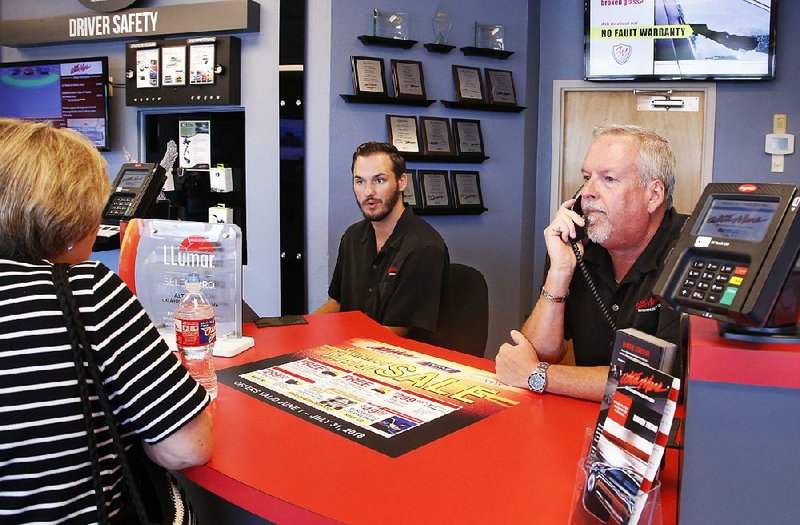NEW YORK -- The plan was for Greg Goodman to sell his auto supply store and retire about the time he turned 60. Then Plan B came along -- his son Chandler decided to join and eventually take over the family business instead of becoming an architect.
Goodman, now 54, is focusing on building his Alta Mere franchise in Oklahoma City rather than getting it ready for sale. He's also mentoring his son, although Chandler won't graduate from college for another two years.
"I make sure he's involved in every aspect of this business moving forward," Greg Goodman says. "I let him in on everything and every decision I make."
As small-business owners contemplate retirement, many are thrilled to have the chance to teach their children or other relatives how to run their companies. There's plenty of opportunity for that to happen -- the government estimates that nearly a fifth of U.S. companies are family-owned. At some businesses, especially those that have been in a family for generations, children start learning some of the basics while on vacation from school.
But owners looking to pass a company on to their children or other younger relatives find themselves doing much more intensive training, including their heirs apparent in key decisions and entrusting them with major projects. The savviest owners learn some things themselves -- they listen to and embrace the different ideas and perspectives their children offer.
Sometimes members of the next generation already have a business background and need to adapt what they know to the specifics of the family company.
Alison Tocci, 61, has been working with her nephew Bryan Sawyer, so he'll be ready to take over the family Bull Run restaurant when she retires. Sawyer left his job at an accounting firm in 2010 to help Tocci turn around the then-struggling restaurant in Shirley, Mass., that she had recently bought from a relative.
Bull Run, founded in 1946 by Tocci's father, has quadrupled its revenue since she took it over, and she wants Sawyer to keep it on its trajectory. So while he takes part in day-to-day operations and weekly meetings, Tocci stresses to him that informal and off-the-cuff meetings with employees, other restaurateurs, consultants and others can help with innovation.
"The most important lesson to transfer to the third generation is to not get stuck in the 'This is the way we've always done it' mode," Tocci says.
In a successful transition from one generation to the next, a parent treats a child as he would any new hire, says David Lassman, a management professor at Carnegie Mellon University's Heinz College.
"If you bring someone in from the outside, you'd say, 'Here's our business, what are our challenges, where should we go?'" Lassman says. He also suggests that owners who tend to be domineering in family situations tone that down, or their children won't be able to think for themselves or take risks as business owners.
A successful transition can require an owner to let the child make significant changes to the company's business model, even selling off parts of it, says Lauri Union, a professor of entrepreneurship at Babson College. While products, services or whole divisions may go, what does remain is what Union calls the family's entrepreneurial legacy.
Union says parents need to, as she puts it, "let go."
"There is a process for letting go -- doing it too quickly can be as bad as doing it too slowly or not at all -- and that process varies from family to family and business to business," she says.
Rita Tabatchnick expects her son Jason to be more than her shadow or stand-in as he becomes increasingly involved in the family's soup business, Tabatchnick Fine Foods. She is looking for him to put his own imprint on the business.
"The new generation comes up with new desires, new foods, new technology, and you have to listen to their ideas," she says. Tabatchnick, 63, who plans to retire within 10 years.
Her nephew, who began working at the company when he was 13, is on the board and participates in Tabatchnick's meetings, key phone calls and negotiations. When the company's Somerset, N.J., factory needed extensive renovations last year, her nephew evaluated contractors' bids. When his mother had surgery recently, he took on some of her responsibilities. "He doesn't just do the grunt work," she says.
Ultimately, though, owners and their children also need to be prepared for the possibility that the planned handoff might not work out, Union says. Children need to have the room to say, "I don't know if this is going to work for me. I may need an off-ramp," Union says. If the son or daughter takes over a company and is unmotivated, it can be hard for the business to survive.
Kathleen Kuhn is realistic about the possibility that her son Ryan might decide against taking over her HouseMaster inspection company. Ryan is doing home inspections, getting hands-on experience, and "little by little we're exposing him to things," says Kuhn, 57. She hopes he'll be ready in four or five years.
But while Ryan approached Kuhn and said he wanted to join the Bridgewater, N.J.-based business that Kuhn's father started 30 years ago, he also thinks about moving out of the area. She would be disappointed if she ultimately must sell the business, but she wants what's best for her son.
"As a second-generation business owner, I never wanted to force my children to choose this path. They need to want it for themselves," Kuhn says.
SundayMonday Business on 07/22/2018
